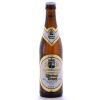Hofbräuhaus Traunstein - Fürsten Trunk
-
ABV:
5.7% -
Serving Temperature:
40-45° F -
Suggested Glassware:
Pilsner Glass, Flute
This “helles” (light or pale) lager pours a crystal-clear pale straw color topped with a large crop of bright white foam. We really enjoyed the aroma on this brew, which is defined by some very expressive, though delicate, Hallertauer hops. Fürsten Trunk is a wonderful showcase for this quintessentially Bavarian hop which leaves its mark on so many fine German beers; look for a beautiful balance among grassy (almost hay-like) notes, spice, earth, and a lightly floral and somewhat lemonish fruity hint. Underneath, crackery malt notes are apparent, as well, which form the mildly bready core of this beer on the palate. All the aroma notes come through here, too, with the end result being just an extremely well-balanced and drinkable beer. We found the malt sweetness and hop bitterness both low, although the hops do hang on a bit in the finish to clear the palate and encourage another sip. Traunstein lagers (cold conditions) Fürsten Trunk for 3-4 months prior to bottling, and it shows in the beer’s smoothness. Pair this brew with a Greek salad with a generous helping of feta, a grilled ham & cheese sandwich, or pan-seared scallops topped with crumbled bacon. Cheers!
Few places are as synonymous with beer as Bavaria, and nowhere is wheat beer more emblematic of a region’s beer culture than in this idyllic and bucolic German state. This month’s featured brewery, Hofbräuhaus Traunstein, was founded as a “weisses bräuhaus” (a brewery for “white” beer, i.e. wheat beer) in 1612 by Maximilian I, a duke who would eventually go on to rule Bavaria as the prince-elector. In fact, the coat of arms of the Bavarian prince-electors still features in the brewery’s logo to this day. Maximilian claimed a monopoly on the production of wheat beer, using the income from his brewery to pay back debts inherited from his father. Despite being in the business of selling beer, the duke’s somewhat puritanical nature led him to issue edicts against excessive drinking of beer (and wine).
The brewery, along with its public bar, was successful from the start. Some of the brewery’s best customers, from the founding all the way into the 20th century, were the hard-working and very thirsty employees of the Traunstein Salt Works. But times were not always rosy; like many old breweries, Traunstein has seen its share of war and fire, such as when the town was pillaged in 1704, and again when arsonists set fire to the town in 1851. Thankfully, the brewery survived the 1851 conflagration when its own beer was used to fight the fire.
The brewery remained in the hands of the prince-electors of Bavaria until the early 19th century when it was sold, and then sold again. It ultimately ended up in the possession of a lawyer named Dr. Hutter, in whose family’s possession the brewery remained until 1896. It was in that year that Josef Sailer acquired the brewery, and it remains in the Sailer family to this day – now in the fifth generation.
Currently employing around 60 people, Hofbräuhaus Traunstein is, naturally, a specialist in the production of traditional and authentic Bavarian beers. The barley and wheat is grown locally in Bavaria, while the hops are produced on Traunstein’s own hop fields in the famous Hallertau region. Similarly, water is sourced from Traunstein’s own mountain springs. The results speak for themselves: over 100 gold and silver medals from the DLG (German Agricultural Society), who take beer rating seriously in a very German way by combining expert taste-testing with laboratory analysis.
Traunstein’s beers are rarely seen on this side of the pond – it’s our treat to have been able to bring these to you this month and we hope you enjoy them as much as we did. Prost!

Unmatched Variety by style, brewery & country
Choose from Five different Beer Clubs offering unmatched variety by brewery,
country of origin, and beer style to suit your specific tastes.


